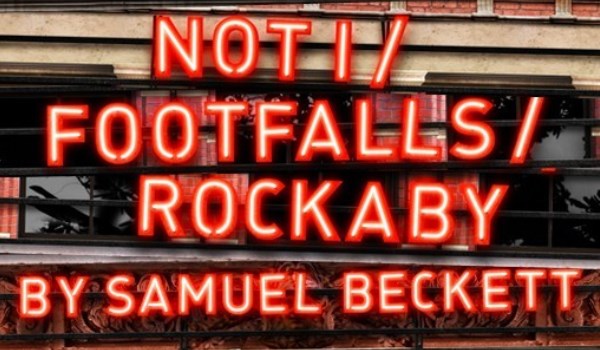A trio of experimental monologues written by Samuel Beckett between 1972 and 1980 – Not I/Footfalls/Rockaby – transferred to the Duchess in London’s West End after a sold-out run at the Royal Court. We caught up with Irish actress Lisa Dwan, lead in the one-woman plays, directed by Walter Asmus, as the 18-show run enters its final week.
When you started performing Not I in 2005, were you intimidated by the role given Billie Whitelaw’s much-feted original?
Yeah. I was so intimidated (that I knew that if I’d seen it I wouldn’t have been able to perform the piece) that I banned any mention of her.
Natalie Abrahami [who directed Dwan’s debut performance at London’s Battersea Arts Centre] helped me find my own access point to the work and not take on her interpretation.
When I took the role for the first time in 2005 I did so, skilfully, without managing to hear any of Billie’s accounts or see her performance which is almost impossible to do because the minute you mention Beckett the next thing out of anyone’s mouth is Billie Whitelaw.
Was it difficult to create your own interpretation of that role?
Because it wasn’t tarnished with any pressure of what the definitive was – no. You know, [having grown up in Ireland] that’s my landscape; that’s my country.
So when he is talking about Croker's Acre I know what he is talking about. And the acerbic parochial colloquialisms – the acerbic asides; the religious pieties; they are that’s my landscape. That’s something I know very intimately.
What advice did Billie offer you when she eventually tutored you for Not I?
I remember two main points that I was extremely concerned about: one, that I was going too fast and she reassured me that Beckett kept telling her ‘you can’t go fast enough’.
He wanted to bypass the actor or the audience’s intellect and to play on their nerves. And the speed was going to enable the piece to do that because the human mind can’t grasp each word. Although, the actor has to pay homage to the role equally and faithfully because they cannot produce a sound and a corresponding emotion and a relationship.
And the other thing I was really worried about was Beckett’s stage instruction ‘don’t act’ (laughs). Does that mean that he didn’t want emotion? No. He wanted all of it.
He didn’t want an intellectualised emotion - a processed piece of actor’s craft. He wanted the real stuff. He wanted the guts. She really helped me understand that.
Given that everyone’s interpretation of Beckett’s work is different, is there a danger the actor could bring too much of their own spin on the works? And do you think it’s important to keep a sense of objectivity?
No. I think it’s a deeply personal journey actually. I think Beckett is asking you to use your own landscape – whatever that might be. So, do I think that Beckett is best performed by Irish people, whose landscape is similar to Beckett’s? No. As long as the landscape is extremely true and isn’t thumbed in and it isn’t covered over by some skill of an actor. Then I think the landscape can be very malleable”
A lot of Beckett’s plays put the actors in difficult positions, Not I being a prime example. Do you think Beckett could be accused of having a sadistic streak?
Um (pauses), no. I mean these extremely difficult physical constraints are just a by-product of the image he’s trying to create.
You know, maybe technology might speed up so that I don’t have to have my head in a head harness throughout, who knows; but I don’t think it’s his intention to deliberately torture the actor.
Although sometimes a persecution complex can take over when you’re tying your head into the harness for the umpteenth time (laughs).
I think what Beckett does give you though are some of the most sublime language ever written and the most expansive roles that I’ve ever come across. And that for me is the privilege - that is the sugar coating for [having to wear] the harness.
 The shows run at the Duchess, London until Saturday
The shows run at the Duchess, London until SaturdayDoes the peculiar set-up of the first play aid or abet any pre-show nerves?
Oh the nerves are so, kind of, high and vast that it’s very hard to know where it begins and where it ends and what helps and what doesn’t.
What’s the hardest part?
The concentration. It’s trying to concentrate in those circumstances. To concentrate despite nerves. And to concentrate despite physical discomfort. And to concentrate despite your constant furrowed mind running its own internal Not I simultaneously while you’re trying to deliver this thing.
How have you found responses to the show at the Duchess?
It’s been fantastic. I can’t get over how three obscure little Beckett pieces have managed to create such an impact. I’m blown away.
Audiences, particularly younger audiences, are really getting it. And that to me is just amazing.
It just shows you the strength of the pieces. I wonder what writers [that] are writing today, will have their work revered 25 years after their death. Or 40 years after they’ve been written.
What are you up to after this run?
I think a little sleep would be nice (laughs). I was just thinking today how it would be nice to have a little sleep somewhere warm.
And this piece is now going on a big tour. We’re taking it to Ireland and to me that’s quite emotional to come back and see how my work has been received there, you know.
Not I/Footfalls/Rockaby runs at the Duchess in London until Feb 15 before touring to Cambridge, Birmingham and Manchester and a worldwide tour.

